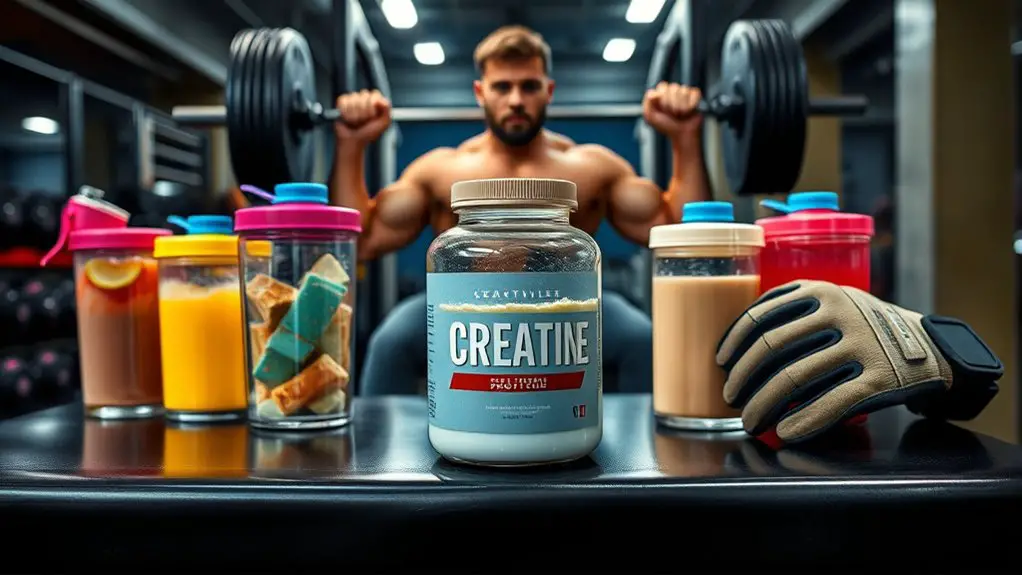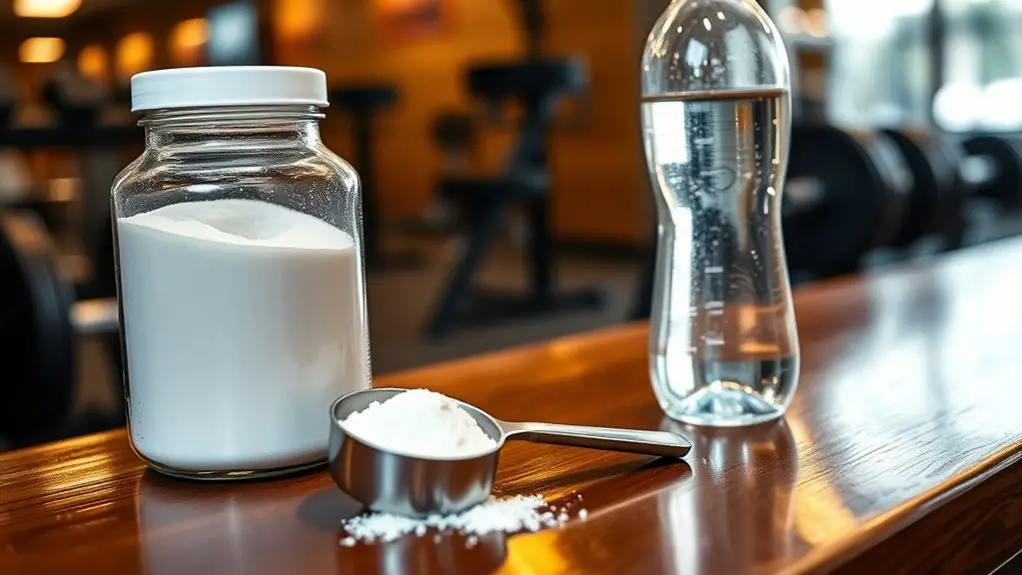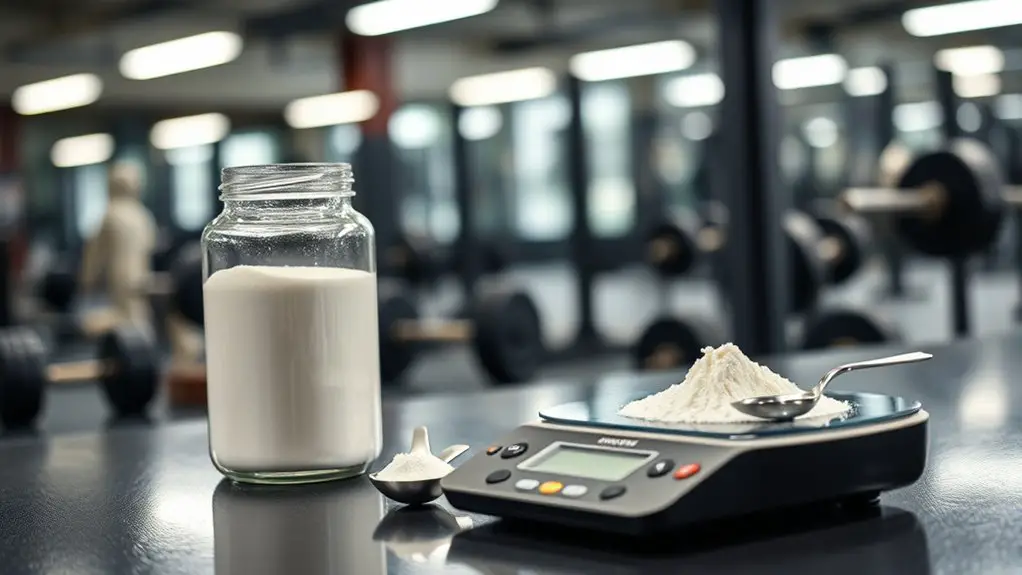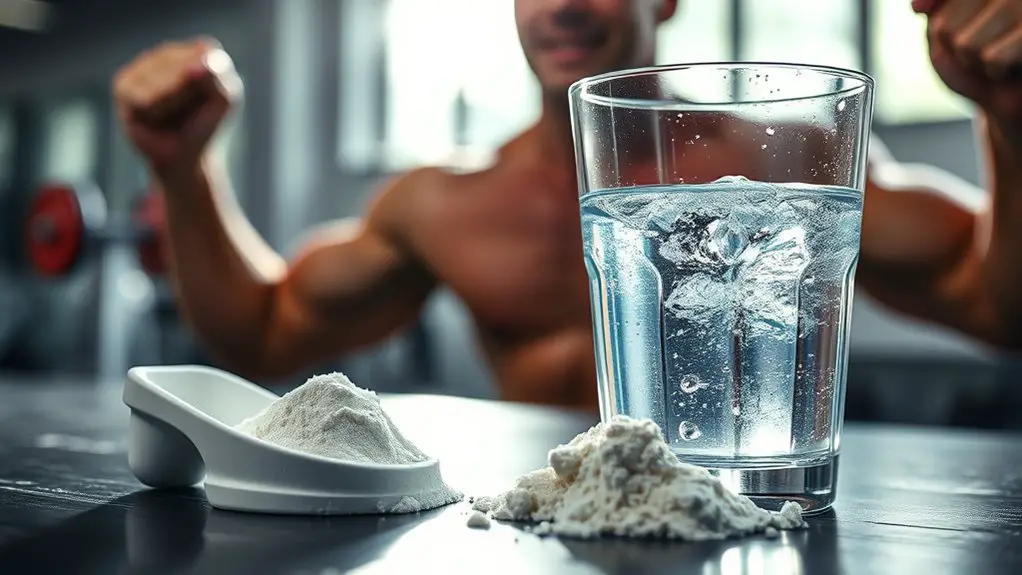How to Use Creatine for Maximum Gym Gains

To use creatine for maximum gym gains, start with creatine monohydrate for its proven benefits. Begin with a loading phase of 20 grams daily for 5-7 days, then switch to 3-5 grams daily for maintenance. Take creatine post-workout for ideal recovery and consider combining it with protein and carbohydrates. Staying hydrated is vital, so aim for at least 3 liters of water daily. You’ll find more tips to enhance your results if you keep exploring this topic.
Understanding Creatine and Its Benefits

Although you may have heard a lot about creatine, understanding its benefits is essential for maximizing your gym gains. Creatine’s historical usage dates back to the 1800s when it was first identified as a compound in meat. Since then, it’s evolved into one of the most researched supplements in sports nutrition.
It’s important to debunk some common creatine myths, such as the idea that it leads to dehydration or kidney damage. Research shows that, when used correctly, creatine can enhance strength, increase lean muscle mass, and improve recovery. It works by replenishing ATP, your body’s primary energy source during high-intensity exercise.
Incorporating creatine into your routine could greatly boost your performance. Just make sure to follow recommended dosages and stay hydrated. By doing so, you’re setting yourself up for greater gains and a more effective workout regimen.
Types of Creatine: Which One to Choose?
Once you’re ready to incorporate creatine into your routine, the next step is choosing the right type. There are several creatine sources available, each with unique benefits. Creatine monohydrate is the most researched and popular choice, known for its proven creatine effectiveness in boosting strength and muscle mass. If you’re looking for faster absorption, creatine hydrochloride (HCL) might be for you, as it’s more soluble and often easier on the stomach.
Another option is creatine ethyl ester, which claims better uptake, though research is mixed. For those who prefer a blend, creatine blends combine various types for potentially enhanced benefits.
Ultimately, the best choice depends on your personal goals and tolerance. Stick with creatine monohydrate if you’re just starting—its effectiveness is well-documented. As always, consider consulting a healthcare professional before diving into supplementation.
Recommended Dosage: Loading vs. Maintenance

When it comes to creatine supplementation, understanding the recommended dosage is essential for maximizing your gains. Many athletes start with a loading phase, typically involving 20 grams of creatine per day, divided into four servings, for about 5-7 days. This method saturates your muscles quickly, helping you experience benefits sooner.
After the loading phase, you’ll shift to the maintenance phase, where you should consume around 3-5 grams per day. This lower dose helps maintain the elevated creatine levels in your muscles without the need for continual high intake.
Research shows that both phases can effectively enhance performance, but the loading phase may yield faster results. However, if you prefer a more gradual approach, you could skip the loading phase and start with the maintenance dose, although it might take a bit longer to see the full effects. Choose the method that best fits your training regimen and lifestyle.
Timing Your Creatine Intake for Optimal Results
Timing your creatine intake can greatly influence your gym gains. Taking it before your workout may enhance performance, while post-workout consumption can aid in recovery. To maximize benefits, consistency in your daily intake is key.
Pre-Workout Timing Benefits
Although creatine can be taken at various times throughout the day, consuming it pre-workout may enhance its benefits for your gym performance. Taking creatine before your workout, especially alongside a pre workout meal, can boost your energy levels and improve workout motivation. Studies suggest that creatine helps increase strength and endurance, making it a valuable addition to your pre-gym routine.
| Time of Intake | Benefits | Recommended Action |
|---|---|---|
| Pre-Workout | Increases energy and performance | Take with a meal |
| Post-Workout | Aids recovery | Combine with protein |
| Throughout the Day | Maintains muscle saturation | Stay consistent |
Post-Workout Recovery Boost
After your workout, the benefits of creatine don’t just end; in fact, taking it post-workout can considerably enhance your recovery. Timing your creatine intake effectively can improve muscle recovery and replenish your energy stores. When combined with carbohydrates and protein in your post workout nutrition, creatine helps to shuttle nutrients into your muscle cells more efficiently, promoting faster recovery and growth. Aim to take creatine within 30 minutes after exercising for best results. Research shows that this timing maximizes the uptake of creatine and enhances its effects on muscle performance and recovery. By incorporating creatine into your post-workout routine, you’ll support your body’s recovery process, helping you get back in the gym stronger and ready for your next session.
Consistency and Daily Intake
To maximize the benefits of creatine, you need to establish a consistent daily intake, ensuring your muscle stores are adequately saturated. This means incorporating creatine into your daily routine, regardless of your workout schedule. A typical dosage schedule includes taking 3-5 grams per day, either before or after your workout. Consistency is key; sticking to your schedule will yield the best results.
Here’s a simple guide to help you track your intake:
| Day | Dosage | Time of Day |
|---|---|---|
| Monday | 5 grams | Morning |
| Tuesday | 5 grams | Afternoon |
| Wednesday | 5 grams | Post-Workout |
| Thursday | 5 grams | Evening |
| Friday | 5 grams | Morning |
Combining Creatine With Other Supplements
When you’re looking to maximize your gym gains, combining creatine with other supplements can enhance its effectiveness and support your overall performance. Understanding creatine synergy and potential supplement interactions is vital for optimizing your regimen. Here are five supplements that work well with creatine:
- Whey Protein: Promotes muscle recovery and growth when taken post-workout.
- Beta-Alanine: Helps improve endurance and delay muscle fatigue during intense workouts.
- BCAAs (Branched-Chain Amino Acids): Supports muscle recovery and reduces soreness, especially during high-volume training.
- Caffeine: Can enhance strength and power output, complementing the benefits of creatine.
- L-Carnitine: Aids in fat metabolism, potentially improving body composition while you gain muscle.
When selecting any combination, always consider how these supplements interact. Consulting a healthcare professional can guarantee you’re making safe and effective choices for your fitness goals.
The Importance of Hydration While Using Creatine

When you’re using creatine, staying properly hydrated is essential for maximizing its benefits. Insufficient water intake can lead to dehydration, which may hinder your performance and recovery. Aim to drink enough water throughout the day, especially around your workouts, to guarantee ideal hydration and support your gains.
Water Intake Recommendations
Staying properly hydrated is essential when you’re using creatine, as it can help maximize your performance and muscle gains. To guarantee peak hydration and maintain electrolyte balance, consider these hydration strategies:
- Drink at least 3-4 liters of water daily.
- Consume fluids before, during, and after workouts.
- Include electrolyte-rich beverages, especially on intense training days.
- Monitor the color of your urine; light yellow indicates proper hydration.
- Adjust your intake based on climate and sweat levels.
Dehydration Risks Explained
While using creatine can boost your workout performance and muscle growth, neglecting hydration poses significant risks. Dehydration symptoms like muscle cramps, fatigue, and dizziness can hit hard, especially during intense workouts. Since creatine draws water into your muscles, it’s essential to stay hydrated to support ideal performance and recovery.
To counteract these risks, adopt effective hydration strategies: aim for at least 3 liters of water daily, increase intake on workout days, and consider electrolyte-rich beverages if you sweat heavily. Monitoring your urine color can also help; pale yellow indicates good hydration. By prioritizing your fluid intake, you’ll maximize the benefits of creatine while minimizing the unpleasant side effects of dehydration. Your body will thank you!
Optimal Timing for Hydration
Maintaining proper hydration is essential for maximizing the benefits of creatine supplementation. When you’re taking creatine, your muscles pull in water, making hydration strategies even more vital. Here are some tips to help maintain electrolyte balance and optimize your hydration:
- Drink water consistently throughout the day, not just during workouts.
- Incorporate electrolyte-rich beverages, especially after intense training sessions.
- Monitor your urine color – pale yellow indicates good hydration.
- Prehydrate before workouts to enhance performance.
- Post-workout, replenish fluids to support recovery.
Creatine and Diet: What to Eat for Best Results

To maximize the benefits of creatine, it’s essential to pair your supplementation with the right diet. Focus on consuming high-quality creatine sources, such as lean meats, fish, and dairy. These foods not only provide creatine but also important proteins and nutrients that support muscle growth and recovery.
Meal timing is key. Aim to take creatine alongside carbohydrates and protein, ideally within 30 minutes post-workout. This can enhance creatine absorption and replenish glycogen stores, making your muscles more receptive to the advantages. Consider a balanced meal with chicken, brown rice, and vegetables, or a smoothie with whey protein and fruits for best results.
Staying hydrated is also important, as creatine draws water into your muscle cells. Make sure you’re drinking enough fluids throughout the day to support both your workouts and overall health. Combining smart meal choices with your creatine regimen can lead to impressive gym gains.
Potential Side Effects of Creatine Use
Although creatine is widely regarded as safe and effective for enhancing athletic performance, it’s important to be aware of potential side effects. While many individuals tolerate creatine well, your experience may vary due to dosage variations and individual responses. Here are some common side effects to take into account:
- Muscle cramping
- Gastrointestinal issues, such as bloating or diarrhea
- Potential interactions with medications
- Concerns regarding kidney health, especially with pre-existing conditions
- Long-term effects that are still being studied
It’s essential to separate creatine myths from facts. Not everyone will experience side effects, and many can be mitigated through proper hydration and adherence to recommended dosages. Always consult with a healthcare professional if you have concerns about using creatine, particularly if you have underlying health issues, as they can provide personalized advice tailored to your needs.
Monitoring Your Progress and Adjusting Your Routine

As you incorporate creatine into your gym routine, regularly monitoring your progress is crucial for maximizing its benefits and adjusting your regimen as needed. Start by establishing clear goals, whether it’s increasing strength, endurance, or muscle mass. Use progress tracking methods like keeping a workout journal or utilizing fitness apps to log your lifts, sets, and reps.
Every few weeks, evaluate your progress against these benchmarks. If you notice plateaus or lack of improvement, it might be time for routine adjustments. This could mean changing your workout split, increasing weights, or altering rest periods to stimulate new growth. Additionally, pay attention to your body’s response to creatine; if you’re experiencing discomfort, consider adjusting dosage or cycling off for a bit. By staying proactive with progress tracking and making timely adjustments, you’ll guarantee that your creatine supplementation works effectively to support your fitness goals.
Frequently Asked Questions
Can Women Use Creatine Safely and Effectively?
Yes, women can use creatine safely and effectively. Research shows that creatine benefits include improved strength, muscle mass, and recovery. For dosage recommendations, starting with 3-5 grams daily is ideal, with some opting for a loading phase of 20 grams for a week. It’s essential to stay hydrated while supplementing, as creatine can draw water into muscles. Always consult with a healthcare provider before starting any new supplement regimen to make sure it’s right for you.
Does Creatine Affect Cardiovascular Health?
Did you know that a study found creatine supplementation may improve endurance in cardiovascular exercise by up to 15%? While most people associate creatine with muscle gains, it also offers benefits for heart health. Research suggests it may help reduce blood pressure and enhance blood flow, which is essential during workouts. If you’re considering creatine, it could support not just your strength but also your overall cardiovascular performance.
Is Creatine Suitable for Teenagers?
If you’re a teenage athlete considering creatine, it’s important to approach it cautiously. Research suggests that creatine can be safe for teens when used appropriately. A typical creatine dosage for young athletes is around 3-5 grams daily. However, it’s necessary to consult a healthcare professional before starting any supplement. Remember, focusing on a balanced diet and training regimen is essential for peak performance and health during your teenage years.
Can I Take Creatine if I Have Kidney Issues?
“An ounce of prevention is worth a pound of cure.” If you have kidney issues, it’s essential to be cautious with creatine. Impaired kidney function can make it harder for your body to process this supplement, potentially leading to complications. You should consult your healthcare provider before considering any creatine dosage. They can give you personalized advice based on your health needs and guarantee you’re making safe choices for your kidneys.
Will Creatine Cause Weight Gain From Fat?
Creatine itself doesn’t cause weight gain from fat; rather, it often leads to increased water retention and muscle retention. When you take creatine, your hydration levels can rise as your muscles hold more water, which may reflect on the scale. However, this is not fat gain. If you’re concerned about weight changes, focus on your overall diet and exercise routine to guarantee you’re promoting healthy muscle growth without excess fat.





